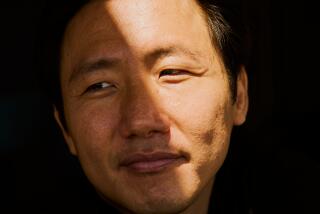BOOK REVIEW : Satirical Look Into the Eye of the Spy : TANGO <i> by Alan Judd</i> , Summit Books, $17.95, 293 pages
- Share via
The unlikely hero of “Tango,” Alan Judd’s parodic spy novel, is a pudgy Londoner managing an English bookstore in an unspecified South American country known for gargantuan beefsteaks, sensual senoritas and volatile politics--all potentially dangerous for the uninitiated.
Though William Wooding seems blissfully unaware of the fact, the bookstore is generally regarded as a front for English espionage, an activity not only tolerated but apparently encouraged by the ruling junta.
At first, Wooding seems a blandly apathetic young fellow, complacently sharing household chores with his restless wife, compensating for his footling job and dreary marriage by overindulging in food, wine and romantic daydreams. He is a bumbler, clearly destined for dissolution in an agreeable backwater.
He’s actually having lunch in the main market, sharing a communal table with a pair of gorgeous girls, when he’s recognized by the new president of the country, touring the market on a flesh-pressing stroll.
Our hero and the president-elect had attended the same minor public school in England, though if the women at the table had been homely, that fact might never have come to light. Because one of the girls is sensationally beautiful, and because one of the perks of the presidency is first choice of the local women, Wooding is warmly greeted by his old acquaintance.
By evening, the entire capital city believes that the bookstore manager has a direct line to the palace. Within hours, Wooding is summoned to the British embassy, where a mysterious Mr. Box is eagerly awaiting him.
Arthur Box has been sent to recruit Wooding for the Special Information Service, a newly privatized clone of the secret service. An under-utilized Briton with free time is just what Box’s outfit is looking for, and Wooding needs little persuasion to sign on. Spying might be risky, but it’s considerably more challenging than dusting the office windows, refilling old invoices, and faking an interest in his wife’s teaching schedule.
The pace of Wooding’s life picks up immediately. Box has the full spy kit and obviously relishes his work. He’s not only a figure of fun with his obsolete transmitter and his exaggerated adherence to the rules of the game, but he’s also eerily plausible.
Wooding quickly shows himself to be a natural at his new profession. Instead of dull evenings alone in the flat with his taciturn wife, he’s dashing around the town, arranging the president’s dates with the ravishing Teresa, boyishly enjoying the whole business of false names, secret codes and clandestine meetings; all to prevent the unstable country from falling into Communist hands.
Inevitably, Wooding himself falls in love with Teresa, dismissing as irrelevant both his marriage and her current position as the president’s mistress, a role she reminds him she’s fulfilled for scores of lesser lights. He couldn’t care less, and since Teresa is so sensible, charming and straightforward, we can practically see her reformed and married to Wooding, graciously serving tea to the vicar and president.
Throughout the book, the author balances on the high wire separating farce from comedy, regaining his equilibrium just as the entire act seems certain to crash into slapstick.
Preposterous as the ensuing events seem, they’re firmly grounded in contemporary reality, making the resemblance between fiction and fact more than coincidental.
Consistently diverting, “Tango” begins as a sendup and ends on a deeper note as highly relevant political satire.
Conscientiously minding his declining business, lulled into complacency by the ease of his life, eager for the adventure and excitement that have always eluded him, Wooding is exactly the sort of man who turns up in a boxed window on “Nightline,” an inadvertent victim of events not only out of his control but utterly beyond the scope of his imagination.
That, of course, is no laughing matter, as the author of this sophisticated entertainment subtly reminds us.
Next: Carolyn See reviews “I Cannot Get You Close Enough” by Ellen Gilchrist (Little, Brown).
More to Read
Sign up for our Book Club newsletter
Get the latest news, events and more from the Los Angeles Times Book Club, and help us get L.A. reading and talking.
You may occasionally receive promotional content from the Los Angeles Times.










